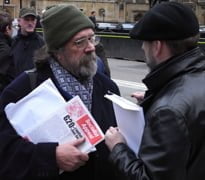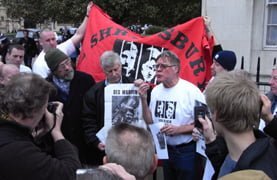Veteran construction workers gathered outside Westminster yesterday to protest against charges brought against them in 1973 for their role in the historic national construction workers’ strike.
The 36-year struggle for justice by the famous Shrewsbury pickets received new impetus as Labour MP Jeremy Corbyn tabled an early day motion in the House of Commons demanding an investigation into the dubious convictions.
In total, twenty-four construction workers from the North Wales area were arrested in 1973, and six of them, Des Warren, Ricky Tomlinson, McKinsie Jones, John Llarch, Ken O’Shea and John Carpenter, were charged with conspiracy and imprisoned for as long as three years.

|
| Ricky Tomlinson, one of the jailed pickets |
Present outside Westminster yesterday, Ricky Tomlinson, now a well known actor, explained that they had been the victims of a conspiracy led by the then Conservative government of Edward Heath, in collaboration with the construction industry management.
At the time, the government claimed that this was a normal criminal trial, but for many the motives were clearly political. 1972 was also the year of the first minors’ strike, and the government was desperate to contain the labour movement and put an end to the strikes and mass picketing. By framing the Shrewsbury 24 it sort to demonstrate to the working class that militancy does not pay.
One of those imprisoned, Des Warren, was quoted at the time as saying that “the law is quite clearly the instrument of the state to be used in the interests of a tiny minority against the majority.”
Later yesterday, at the House of Commons meeting, Mr Tomlinson told MPs that government documents from 1973 relating to the case have been kept secret on the grounds of national security.
“I have tried using the Freedom of Information Act to see documents connected to the case but the Home Office has blocked their release. Why?"
"We want a pardon, and a public inquiry into the prosecution and the trials.”
The motion, supported by Labour MPs Dennis Skinner and John McDonnell, also seeks to establish why the dispute was seen as a threat to national security and whether the real conspiracy was waged by employers and the Tory government.
That the government of the time saw fit to imprison workers, who were simply striking for better working conditions, as part of a conspiracy against the democratic rights of working people is deeply disturbing. The way the state mobilized police, army, and the law courts against the workers throughout 1972 revealed quite clearly its true class character.
The lesson that we should learn from the struggle in 1972 is that the interests of the state conflict with the interests of the great majority of working people. Therefore, the fight for better working conditions, for better living conditions, and the fight for real democracy, is a fight for socialism.






